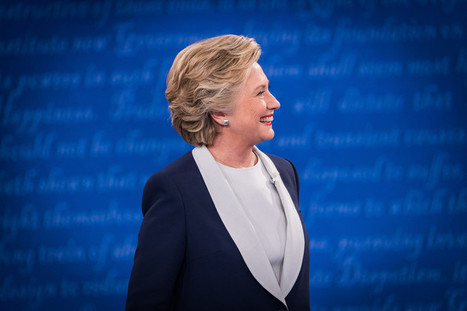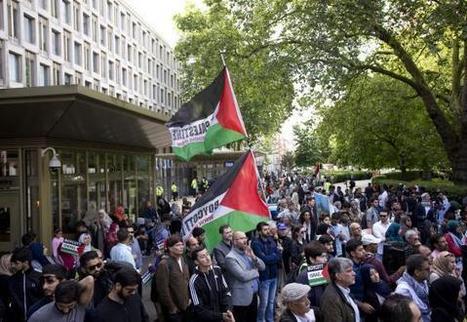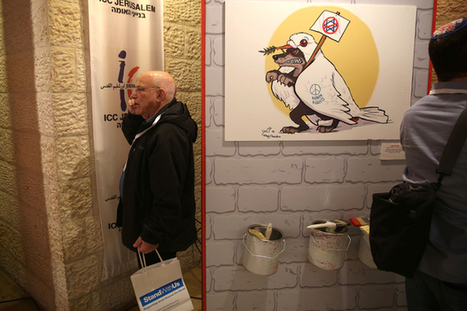Jewish American Explains Why She Supports #Palestine and #BDS ( #Boycottisrael) - The Real News - #Israel #CodePink #ArielGold
Get Started for FREE
Sign up with Facebook Sign up with X
I don't have a Facebook or a X account

 Your new post is loading... Your new post is loading...
 Your new post is loading... Your new post is loading...
Leaked emails show donors drive #HillaryClinton ’s pro- #israel positions #BDS #zionism #corruption Democratic nominee revealed her real views on Syria and Saudi Arabia only behind closed doors. A batch of internal Clinton campaign emails published by Wikileaks in recent days reveals the extent to which campaign donors drive Hillary Clinton’s rhetoric and policy positions on Israel and the broader Middle East. Last year, Hillary Clinton wrote a letter to billionaire media mogul Haim Saban on her campaign stationery vowing “to make countering BDS a priority” if she wins the presidency. Saban has donated at least $7 million to getting Clinton elected president and openly confesses that his number one priority is influencing US policy in Israel’s favor. According to the emails between Clinton’s senior campaign aides, the letter to Saban was deliberately leaked to friendly media to attract pro-Israel donors concerned about the rise of the BDS – boycott, divestment and sanctions – movement. The way the campaign aides discuss the issue is completely devoid of emotion or ideology. It’s all about the donors. Opposing BDS to please donorsIn a 3 July 2015 email to campaign staffers, Clinton’s campaign manager Robby Mook wrote, “I was just thinking: has she made a clear statement on Israel yet? I get this question from donors all the time. Does she need to state her principles on Israel before Iran? Or do both at the same time?” “That’s basically the goal of the BDS letter,” responded Clinton speechwriter Dan Schwerin. “We could either get a donor to leak it or just give it to a reporter if we want to get it out there. I’m semi-surprised it’s not out yet,” replied deputy communications director Christina Reynolds. Clinton’s voice is nowhere to be seen in the correspondence. “We have a two pager I’m getting clearance from her on. That is what we have to ship around,” Jake Sullivan, a senior foreign policy adviser to Clinton, wrote. “Let’s def give it to someone. I see zero downside to a story. Then we can circulate around right away (hopefully) in advance of Iran,” reasoned Mook. “If Haim’s going to give it to the Jewish media, I think that solves our problem. Once they write, we can make sure it gets picked up by some of our beat guys,” Christina Reynolds responded. Three days later, Politico reported on and published the letter. The emails show Saban coordinating directly with the Clinton campaign, offering positive reinforcement for Clinton’s pro-Israel messaging and strategizing with Clinton aides against BDS. Israel’s liaisonThe emails show that Stuart Eizenstat, a former US ambassador to the EU under President Bill Clinton, acted as a liaison between the Israeli government and the Hillary Clinton campaign, counseling senior staffers on how to adjust their messaging to the liking of the Israeli leadership. Eizenstat wrote lengthy and detailed emails to campaign aides summarizing his meetings with Israeli government officials and recommending talking points for Clinton to adopt. The Clinton campaign frequently thanked Eizenstat for his counsel, regularly implemented his suggestions and often sought his approval on speeches related to Israel. “I took some of your concepts but left out the specifics,” foreign policy adviser Sullivan wrote in a July 2015 email to Eizenstat. Sullivan was seeking pointers for Clinton’s statement in response to the passage of the Iran nuclear deal. A month earlier, Sullivan messaged Eizenstat for advice on BDS: “I was talking to HRC [Hillary Clinton] today about the idea of having her meet with some Jewish leaders later this week about BDS/delegitimization efforts. She and the leaders could go out and make a statement following the meeting.” Sullivan sought Eizenstat’s opinion on who Clinton should include in such an initiative. Netanyahu is ready for HillaryIn December 2015, Eizenstat reported on his “meeting with a senior [Israeli] official who is very close to the Prime Minister [Benjamin Netanyahu], and knows his thinking.” “The prime minister always had a ‘surprising good relationship’ with Hillary; she is ‘easy to work with,’ and that she is more instinctively sympathetic to Israel than the White House,” Eizenstat wrote. The official also told Eizenstat that “Israel [sic] Arabs are a ‘real problem.’ The government had to dismantle the northern branch of the Islamic Association because they were radicalizing the Israeli Arabs, who are 20 percent of the population.” Eizenstat was referring to Israel’s ban on the Northern Branch of the Islamic Movement, a political party with a large following among Palestinian citizens of Israel. Eizenstat’s emails also reflect the Israeli leadership’s intense hostility toward President Barack Obama. In a May 2015 email to the Clinton campaign, Eizenstat noted that in his meeting with the Israelis, “The level of vitriol against the president was striking, to such a degree that one participant urged that he was being unfairly demonized.” In June 2015, Eizenstat wrote, “I was struck in my week in Israel, not only among Israeli officials, but among my friends across the political spectrum (most are former officials) and apolitical relatives, at the depth of antipathy and distrust of President Obama, as ‘weak,’ ‘pro-Muslim’ and ‘anti-Israel.’” “Attack, attack, attack”In another June 2015 email, Eizenstat provides details of a meeting with Netanyahu and his cabinet in which Netanyahu urges attacking BDS and recruiting Latinos, Evangelical Christians and Asian Americans to assist in the effort. Summarizing Netanyahu’s views, Eizenstat wrote: “On BDS, Israel should move from the defense to the offense. It should be attacked on moral grounds. It is ‘unjust’ and ‘cruel.’ Israel must attack its attackers. The best defense is a good offense: ‘attack, attack, attack.’” Smearing BDSIn an August 2015 email labeled “NOT FOR CIRCULATION,” Eizenstat passed along advice to Hillary Clinton from Ron Dermer, Israel’s ambassador in Washington. A US-born right-winger who has been called “Bibi’s brain,” Dermer told Eizenstat that the Israeli government was plotting to smear Palestine solidarity activism on college campuses as terrorism. “They will shortly expose the funding base for the main BDS group on campus, Students for Justice in Palestine, which tie it with terrorist funding,” Eizenstat wrote. “The key is to expose BDS as anti-Semitic and anti-Israel.” No-fly zone would “kill a lot of Syrians”During the Democratic Party primary race, Bernie Sanders repeatedly called on Clinton to release the transcripts of her paid speeches to Wall Street banks, but she refused. One of the most damning aspects of the latest Wikileaks dump is the excerpts of Clinton’s paid speeches. In a speech to Goldman Sachs in 2013, Clinton confessed that a no-fly zone in Syria would “kill a lot of Syrians.” This is because it would require bombing Syria’s air defenses, “many of which are located in populated areas,” according to Clinton. While making this assessment in private, Clinton has continued to publicly advocate for a no-fly zone, ostensibly to protect Syrian civilians. Saudi support for ISISClinton told the Jewish United Fund of Metropolitan Chicago at a luncheon in 2013 that Israel and Jordan were working in close partnership for the purpose of “shoring up King Abdullah.” That same year she told congregants at a synagogue, “One of the developments of the Arab Spring is that you now have Israel and Saudi Arabia more closely aligned in their foreign policy” in the region. Publicly, Clinton frequently casts Iran as the single greatest funder of terrorism in the world. But privately she has repeatedly acknowledged Saudi Arabia’s contribution to violent extremism. At a Jewish United Fund dinner in 2013, Clinton said she preferred “a more robust, covert action” to arm Syrian rebels against the government of Bashar al-Assad. But she added that this was complicated because, “the Saudis and others are shipping large amounts of weapons – and pretty indiscriminately – not at all targeted toward the people that we think would be the more moderate.” She also described Saudi Arabia’s fierce opposition to the Muslim Brotherhood as “kind of ironic since the Saudis have exported more extreme ideology than any other place on earth over the course of the last 30 years.” In one of the leaked emails Clinton accuses Saudi Arabia and Qatar of funding the Islamic State, sometimes referred to as ISIS or ISIL. Citing “Western intelligence, US intelligence and sources in the region,” Clinton wrote, “We need to use our diplomatic and more traditional intelligence assets to bring pressure on the governments of Qatar and Saudi Arabia, which are providing clandestine financial and logistic support to ISIL and other radical Sunni groups in the region.” It’s all about the donorsThe Clinton Foundation has accepted millions of dollars from Saudi Arabia and Qatar. And while serving as secretary of state, Clinton greenlighted enormous weapons deals to those countries. From Israel to Saudi Arabia, it is clear that Clinton’s donors are in charge. They exert more influence over her public positions and policy prescriptions than she does. If Clinton were running against Senators Ted Cruz or Marco Rubio, these emails would be scandalous. Instead, the leaks have been completely overshadowed by the even more sensational and lurid October surprise that befell Republican nominee Donald Trump. Clinton is lucky her opponent is more disliked and disingenuous than she is. |
#Israel publishes blacklist of organisations banned from entering country over boycotts - The Independent #WarAgainstJustice #BoycottIsrael #IStandWithBDS #BDS #Palestine #FreePalestine Israel has published a list of organisations supporting a boycott campaign against the country, whose activists will be banned from entering the Jewish state. Members of 20 groups which back the Boycott, Divestment and Sanctions (BDS) movement will be denied entry visas and residency rights under a controversial law.
The #Zionism debate as a shield for Israeli policy by #RichardFalk #BDS #antisemitism #israel #Palestine Sunday 5 June 2016 10:39 UTC Critics of Zionism were not historically motivated by hatred of Jews, but by the belief that Israel as a state was proceeding in a racist manner More than 40 years ago, the UN General Assembly adopted the controversial Resolution 3379 by a vote of 72-35 (with 32 abstentions), determining “that Zionism is a form of racism and racial discrimination”. This resolution was bitterly opposed by Israel and its friends, who called it an assault on the dignity of the Jewish people, and a blatant expression of anti-Semitism that exhibited hurtful insensitivity to the long dark shadow cast by horrific memories of the Holocaust. The Israeli ambassador to the United Nations, Chaim Herzog, was unsparing in his denunciation: “For us, the Jewish people, this resolution based on hatred, falsehood and arrogance, is devoid of any moral or legal value.” The American ambassador, the colourful diplomat Daniel Patrick Moynihan, was hardly less severe in a stark assertion in the debate preceding the vote: “The UN is about to make anti-Semitism international law. The [US] does not acknowledge, it will not abide by, it will never acquiesce in this infamous act ... a great evil has been loosed upon the world.” But waving the red flag of anti-Semitism was a tactical manoeuvre by Israel and the US to falsify the intent of the anti-Zionist resolution. The supporters of the initiative at the UN were never motivated by hatred of Jews, but by the belief that Israel as a state was proceeding in a racist manner in its treatment of the indigenous Palestinian population. In fact, the focus on Zionism rather than Israel reflected an ongoing commitment by Palestinians and their allies to accept the reality of Israel as a state, while rejecting the policies and practices that were being attributed to the Zionist ideology that prevailed in Israel’s governing process. Asserting its diplomatic muscle over the years, Israel managed to induce the General Assembly to reverse itself in 1991 by Resolution 46/86, simply revoking the earlier resolution without offering any explanation. Israel secured this vote by conditioning its participation in the Madrid Peace Conference that same year on a formal repudiation of the 1975 resolution. In retrospect, the General Assembly made a serious mistake by equating Israel with Zionism. It should be understood that Zionism is a political project devised by Jews in Europe at the end of the 19th century and, while responsible for the world movement that successfully established Israel against great odds, it does not represent the Jewish people as whole. From its inception, Jews as individuals held wildly divergent views about the wisdom of Zionism in theory and practice as well as its relations with Judaism. It is a different and much more difficult issue that is raised by allegations that Israel as of 2016 behaves as a racist or apartheid state, especially with respect to its discriminatory administration of the West Bank and Gaza. To be clear, it is not Zionism that should be evaluated as racist, but Israel as a state subject to international law, including the International Convention on the Elimination of Racial Discrimination (1966) and the International Convention on the Crime of Apartheid (1973). At this time, complaints about anti-Semitism have taken an entirely different course. Instead of deflecting criticism at the UN with angry claims of institutional bias verging on anti-Semitism, Israel is actually invoking the prestige of the UN to carry on its fight against the BDS campaign. On 31 May, Israel convened a day-long conference under the wilfully misleading title, “Ambassadors Against BDS - International Summit at the UN.” Invited speakers were restricted to pro-Israeli extremists who deplored BDS as a political initiative and denounced its activist supporters as anti-Semites. The right-wing Israeli ambassador, convenor of the conference, Dani Danon, minced no words: “BDS is the modern incarnation of anti-Semitism,” spreading an “ideology of hate”. The programme was unabashedly one-sided, with the conference sponsored by a series of leading Jewish organisations. The audience consisted of 1,500 invited guests who possessed strong anti-BDS credentials and who were encouraged to be militant in their opposition to BDS activities. The conference call relied on language that helps us grasp the political significance of this extraordinary initiative: “The BDS movement continues to make strides in their campaign to delegitimise the State of Israel. They are gaining increased support on campuses around the world as they promote initiatives on local and national levels calling to divest and boycott the Jewish state.” Such a statement confirms the reality of BDS as a rapidly strengthening global solidarity movement that aligns itself with the Palestinian national movement, and is effectively mobilising beneath the BDS banner. It should be clarified that the anti-BDS summit, appearances not withstanding, was not a UN conference. It was an event organised by the Israeli delegation at the UN that was allowed to make use of the UN as a venue. Calling itself "Ambassadors Against BDS” is deceptive, suggesting some kind of collective diplomatic undertaking by the international community or at least its Western segment. In actuality, several European governments normally supportive of Israel, including Sweden, Ireland, and even the Netherlands, have recently officially indicated that support for BDS is a legitimate political activity, entitled to the protection of law in a democratic state, and should be treated as falling within the right to freedom of expression. To be sure, Israel and pro-Israeli civil society actors have been pushing their BDS demolition campaign in a variety of venues. Among those most salient have been the successful efforts of the organised Jewish community in Britain to have an academic conference at Southampton University cancelled for two consecutive years, the frantic defamatory assault on Penny Green, the distinguished British criminalist who had been proposed as UN nominee as Special Rapporteur for Human Rights in Occupied Palestine, a travel ban imposed by Israel on Omar Barghouti, the widely admired worldwide leader of BDS, and sundry outrageous efforts throughout the US to have as many state legislatures as possible pass laws that criminalise BDS by associating its advocacy with anti-Semitism. Above all, this ugly effort to stigmatise BDS represents a shift in the essential battlefield of the Israeli-Palestinian struggle from one of armed struggle to one of symbolic encounters concerning the legitimacy of Israel’s policies and practices. This shift should be welcomed. The BDS Campaign concentrates on university campuses, churches, and labour unions. To challenge the legality and propriety of its tactics is to attack the most fundamental values of constitutional democracy. BDS-bashing also lends indirect credibility to those who argue that only political violence can achieve justice for the Palestinian people that alone can end their unspeakable ordeal. This deadly dance between Zionism and the UN has now come full circle. In the 1970s, Zionism was condemned at the UN, and the condemnation was sharply criticised as anti-Semitic. Now in 2016, Israel relies on its UN membership to empower Zionist forces throughout the world to engage in BDS-bashing. In the end, we should appreciate that neither Zionism nor BDS is racist, and the real focus should be on the behaviour of Israel as a member of the UN obliged to respect international law. - |











